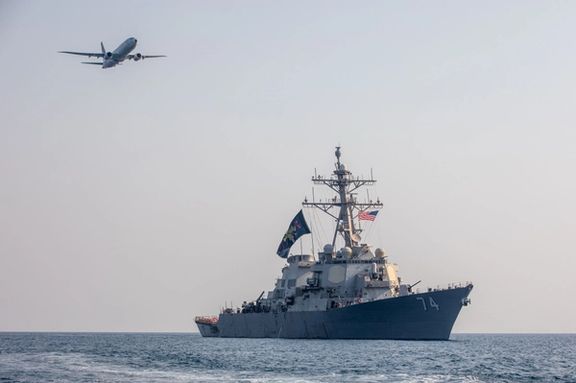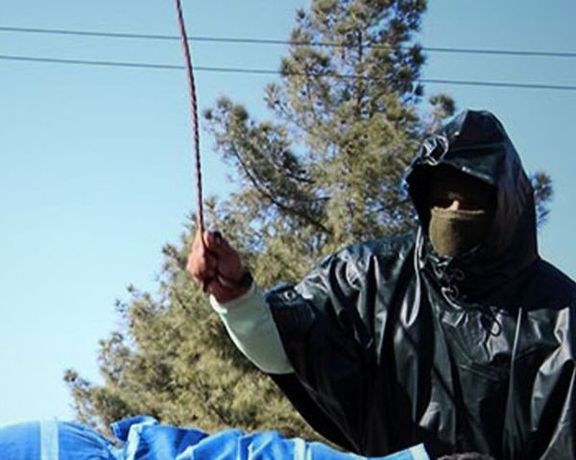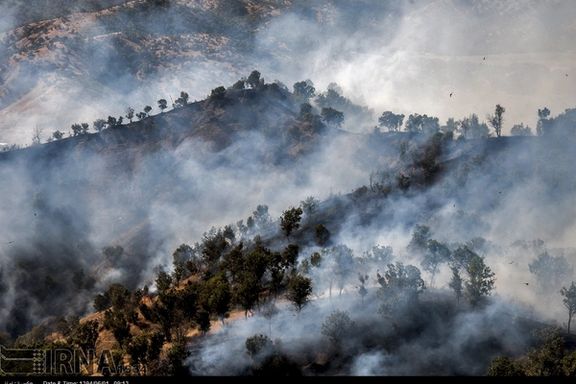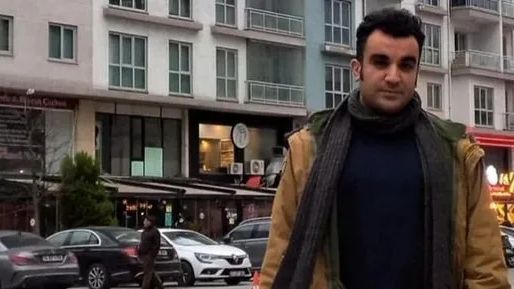Iranian Human Rights Activist Sentenced To Additional Prison Time

Narges Mohammadi, a prominent imprisoned Iranian human rights activist has been handed down an additional one year jail sentence in a new verdict.

Narges Mohammadi, a prominent imprisoned Iranian human rights activist has been handed down an additional one year jail sentence in a new verdict.
This latest decision by the judiciary of the Islamic Republic has increased her total sentence to 10 years and 9 months in prison, coupled with 154 lashes.
The verdict stems from Mohammadi's alleged offense of "propaganda against the system by giving a statement from inside the prison," as stated on her Instagram page. In the said statement, she voiced her protest against the "harassment and sexual abuse of women" in detention centers, and addressed a letter to Javaid Rehman, the Special Rapporteur on the Situation of Human Rights in the Islamic Republic of Iran.
This particular case is one of the five ongoing investigations against Narges Mohammadi, conducted by the Evin Security Prosecutor's Office.
Refusing to participate in the hearing of the new accusations, Mohammadi, the Deputy Director of the Defenders of Human Rights Centre (DHRC), boldly declared that she "does not recognize the Islamic Republic and its sham and deceptive courts," as conveyed in her Instagram post.
The preliminary verdict was communicated to Mohammadi while she remains detained in the women's ward of Evin prison. However, she did not sign the receipt of the verdict.
In recent months, despite her confinement, Mohammadi has been an outspoken advocate for the uprising of Iranians against the Islamic Republic. From inside the prison, she has openly condemned repression against protesting students, citizens, and the Baha'i community, among others.
Narges Mohammadi's imprisonment dates back to November 2021, and she continues to serve her sentence.

Iran unveiled a series of what it called new maritime weapons this week as Washington appeared to be increasing pressure on Tehran on at least two fronts.
In its boldest move to deter Iran since assuming office, the Biden administration signaled on Wednesday that it may soon offer to put armed sailors and Marines on commercial ships traveling through the Strait of Hormuz.
The Pentagon last month had already sent additional F-35 and F-16 fighter jets along with a warship to the Middle East in a bid to monitor key waterways in the region following Iran's seizure and harassment of commercial vessels.
The Islamic Revolutionary Guard (IRGC) held drills around three Iranian islands in the Persian Gulf contested by the United Arab Emirates and claimed that it has added a 600-kilometer-range new missile to its arsenal “for defending the islands’ territory.”
Hossein Salami the commander of the IRGC delivered another speech on Saturday, praising what he called unprecedented advances the Islamic Republic ha made in naval power. In typical veiled language Salami said that “the enemy’s presence instead of posing a threat became an opportunity…and we expanded our defense and military” capabilities.
Salami also stated that Iran has been able to de-couple “the enemy’s military power” from its psychological dimension, implying that Tehran is not afraid of the overwhelming power wielded by the United States.

By offering to protect commercial vessels, the United States may be trying to prevent what it anticipates as inevitable Iranian escalation amid a lack of an agreement on Iran’s nuclear program and continuing US sanctions that have led to a hopeless economic situation for Tehran. But the show of force could also be apart of Washington’s efforts to re-engage in the Middle East to show Saudi Arabia and its allies in the Persian Gulf that it is the ultimate guarantor of security.
Vice Admiral Brad Cooper met met with Gulf Cooperation Council Secretary General, Jasem Mohamed Al Budaiwi, in Riyadh to discuss “maritime collaboration for ensuring the free flow of global commerce in & near critical regional waterways,” US Naval Forces Central Command announced Thursday.
Already, the US Navy is authorized to defend vessels belonging to countries with whom there is a mutual defense agreement, including Saudi Arabia and its Persian Gulf allies. However, Al-Monitor cited US officials as saying that the Pentagon has been discussing options with the National Security Council to expand maritime commercial defense “potentially including ownership of the ship or its cargo.”
As the Biden administration appears to be adopting a more forceful posture in the Persian Gulf, it is also ramping up pressure on Tehran over the issue of Iranian drone supplies to Russia.
NBC news reported Friday that the Defense Intelligence Agency (DIA) has decided to show foreign officials “undeniable” evidence of the Iranian origin of drones shout down over Ukraine.
Washington first warned about Tehran’s plan to supply attack drones to Russia in July 2022 and in October it announced that indeed Moscow had started to use Shahed kamikaze drones against Ukraine. In February the DIA issued a report saying that analysis confirmed Russia’s use of various lethal Iranian unmanned aerial vehicles (UAVs) against Ukraine.
Iran has retaliated in recent days by calling for a halt to Western arms supplies for Ukraine blaming the assistance for prolonging the war.
Iran has long been an ally of Russia both in the Syrian civil war and during the invasion of Ukraine despite its claims of neutrality. The government media in Tehran has displayed clear support for Russia and officials have never condemned Moscow's attacks on civilians. So far, Russia has used hundreds of Iranian-made drones against Ukrainian civilian and infrastructure targets.

Iran's judiciary has dramatically increased lashing sentences against civil and political activists following the Mahsa uprising, according to Iran's Prison's Atlas.
The issuance of such sentences, part of the Islamic penal code, has quadrupled compared to the previous year, with at least 117 activists, including 13 women and 104 men, being sentenced to a total of 7,404 lashes, alongside 99 years and three months in prison and a fine of 1.16 billion rials (approximately $2300).
The charges leading to these sentences primarily involve "disturbing public order and publishing falsehoods with the intention of disturbing the public opinion," as per the Islamic Penal Code.
Comparing the current statistics to the period from September 2021 to October 2022, the judicial system had sentenced 29 political and civil activists, comprising 18 women and 11 men, to a total of 1,970 lashes, 32 years and 10 months in prison, and 510 million rials in fines.
The Atlas of Iranian Prisons strongly criticized the authorities for employing whipping, despite being aware of its physical and psychological harm, to suppress citizens and political opponents and maintain ideological control.
The increase in flogging sentences coincides with ongoing concerns about the treatment of protesters following the revolutionary uprising of Women, Life, Freedom. Many arrested protesters currently face the risk of execution, and the judicial system has already carried out death sentences against seven of them.
Disturbingly, numerous reports have emerged detailing incidents of rape, assault, and sexual harassment against some arrested protesters during the uprising. Moreover, several other detainees have suspiciously died shortly after their release from prison.

Two Iranian well-known sports journalists who were in Australia to cover FIFA Women's World Cup have said they will not return to Iran.
Saeed Zahedian, the chief sports editor of the Iranian government's Iran Newspaper, and Naeem Ahmadi, the newspaper's photojournalist, plan to apply for asylum in Australia, they told Iran International.
Iran Sports daily is among the most popular newspapers in Iran and Naeem Ahmadi is one of the best sport photographers of Iran.
Last week, two Iranian female journalists, who were arrested during anti-regime protests, were sentenced to three years and seven months in prison. In addition, the journalists opposed compulsory hijab during court proceedings, which led to further controversy, as reported by the US-based Human Rights Activists News Agency (HRANA).
The regime has intensified pressure against journalists. Earlier this month, Behrooz Behzadi, who is in his late 70s as is the editor in charge of Etemad newspaper, ‘accused of publishing false content’ following a complaint by Revolutionary Guard Corps and banned from any kind of press activity for one year.
The increasing repression against journalists has drawn condemnation from various quarters, including the Tehran Journalists’ Association, which denounced the issuance of "heavy and unconventional judicial sentences against journalists" and urged the judicial system to halt such practices.
The Islamic Republic's track record as a major repressor of the media has drawn international attention. However, the current wave of repressions has escalated since the nationwide uprising against the regime.

As the forest fire near the border with Iraq enters its second day, an Iranian government official has highlighted the alarming extent of the blaze.
Saeed Karimi, the Director General of Kordestan Governorate Crisis Management, revealed that the fires are spreading across the forests of three border villages in Marivan.
Karimi expressed concerns over the fire's magnitude, stating, "The scope of these fires is very high." He also noted that the area faces additional risks due to the presence of ammunition remnants from the Iran-Iraq war, with recent explosions adding to the challenges faced by firefighters.
The affected villages include Gomareh Lang, Darreh Varan, and Asanabad, with firefighting efforts intensified to contain the devastating blaze. Despite round-the-clock efforts by volunteers, the blaze has already extended to a nearby village.
The cause of the fire has not yet been officially confirmed, but authorities have not ruled out potential involvement from security institutions or profiteers.
There are suspicions that the IRGC may be responsible, allegedly setting fire to the forests to hinder the concealment of individuals and groups classified as "terrorists" by the Islamic Republic.
This is not the first time such fires have affected the Kordestan province. Three years ago, parts of the Zagros forests in the Kosalan mountain area of Sarvabad city suffered an intentional fire, reportedly ignited by an individual on a motorcycle, causing destruction to over 15 hectares of forests.

The Turkish government is facing criticism for its treatment of Iranian dissidents seeking political asylum in this country.
The recent arrest of Mohammad Lahmi, a former airline pilot and a cleric who fled from Iran in 2022, has highlighted the growing apprehension among activists.
His prosecution and arrest is said to have stemmed from a business dispute involving influential businessmen closely linked to the Revolutionary Guards.
Lahmi had sought refuge in Turkey to escape persecution by the Iranian regime, but even while residing in Turkey, he continued to criticize the Iranian government through his social media platform.
Activists argue that since the Iranian regime provided political support to President Recep Tayyip Erdogan's government following a failed coup in 2016, Turkey's willingness to shelter Iranian dissidents has diminished. This has led to an increase in deportations back to Iran, where dissidents fear for their safety and well-being.
In December 2019, two Iranian protesters, Mohammad Rajabi, 25, and Saeed Tamjidi, 27, faced a high-profile case when they were arrested and deported to Iran. Turkish police handed them over to Iranian authorities, leading to their transfer to Evin prison.
Despite their death sentences being rejected in appeal courts, they were imprisoned for several years, along with another protester, following several months of detention.
Adding to the growing concern, reports have emerged of another Iranian political activist, Shahriar Baratinia, being deported from Turkey to Iran on Thursday.
Baratinia, a former political prisoner who had been residing in Turkey without a residence permit, faces potential danger upon his return to Iran, according to human rights website Hirman.
Human rights groups are closely monitoring the situation, calling on Turkey to reconsider its approach towards Iranian dissidents.